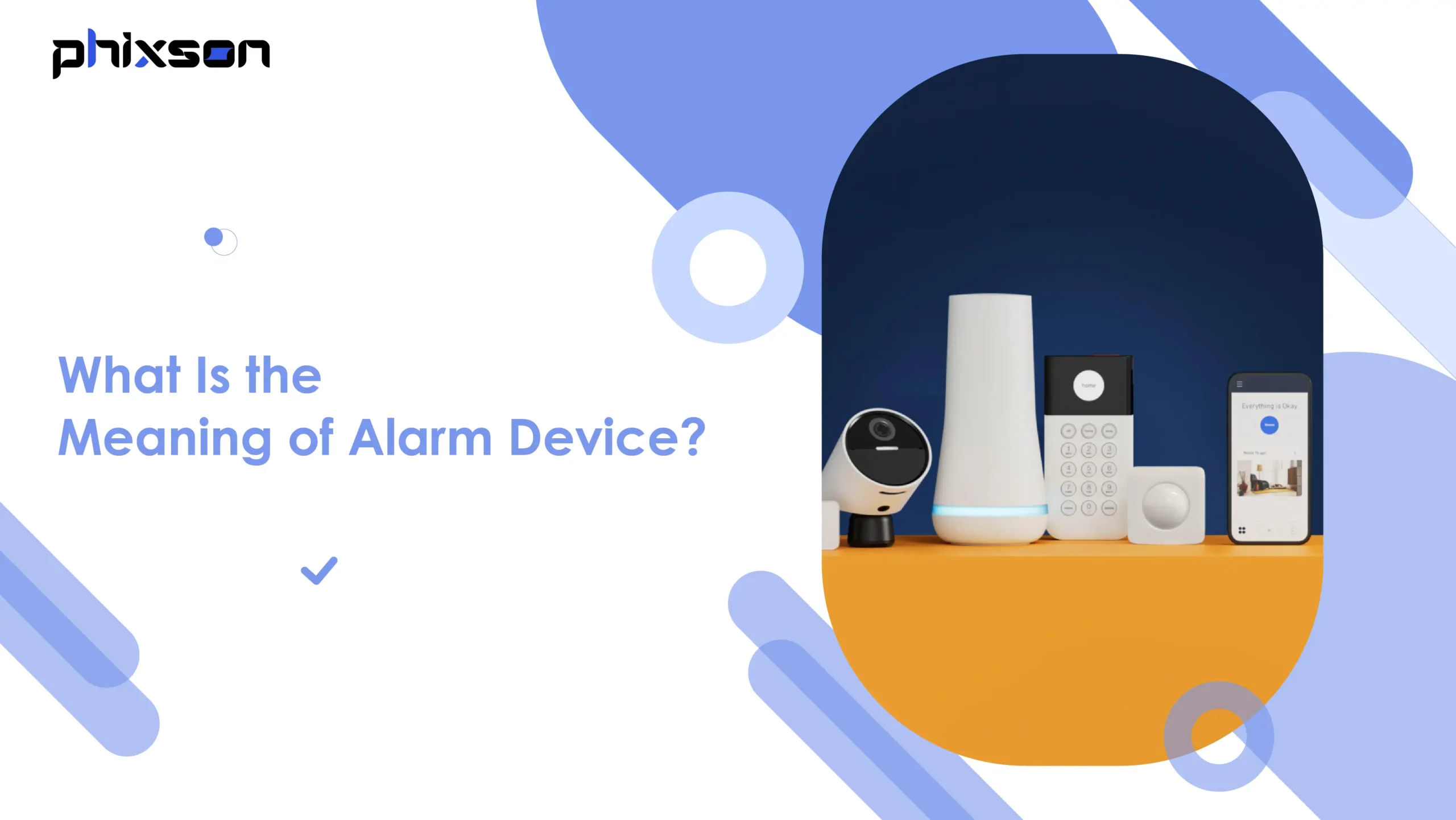Different dictionaries have different explorations on what is the meaning of alarm device.
| E-Dictionary | Meaning |
| Vocabulary.com | A device that signals the occurrence of some undesirable event |
| Wikipedia | An alarm device is a mechanism that gives an audible, visual, combination, or other kind of alarm signal to alert someone to a problem or condition that requires urgent attention. |
| Law Insider | An alarm device means any device or series of devices installed on real property and designed to detect criminal activity or unauthorized entry or emergency which when activated, emits or transmits a local or remote audible, visual, or electronic signal intended to alert the “alarm system owner”, summon the police service, whether monitored by an “Alarm Business” or not. This definition does not include an alarm installed in a vehicle or on a person unless the vehicle or personal alarm is permanently located at the premises. |
| Collins | A set of electronic devices that trigger an alarm. The car has a full leather interior and an alarm system. |
| The Free Dictionary | A device that signals the occurrence of some undesirable event |
| Cambridge Dictionary | A device that makes a loud noise to warn of danger: |
| YourDictionary | A burglar alarm. |
What Is the Meaning of Alarm Device?
An alarm device is specifically designed to prevent sudden incidents. It can promptly notify relevant institutions or personnel of dangerous situations so that measures can be taken quickly. These devices play important roles in daily life and work. In home security, alarm devices like door/window sensors and infrared detectors can detect and warn of potential theft or intrusion. In industrial settings, explosion-proof audio-visual alarms can issue timely warnings in flammable environments, prompting workers to take swift action to prevent accidents.
What does Alarm and Active Device Mean?
Active alarm devices continuously emit detection signals during operation. These signals are received after feedback and processed by the system’s signal processor to determine if alarm conditions are met. Once conditions are satisfied, the system immediately issues an alarm signal. In contrast, regular alarm devices don’t need to actively emit detection signals. They mainly determine alarm conditions by monitoring real-time signals from the monitored object. While regular alarm devices also issue alarm signals when detecting abnormalities, they are relatively passive in terms of detection initiative and signal transmission. Therefore, active alarm devices typically demonstrate higher performance in monitoring and alarm timeliness and accuracy.
Types of Alarm System
Alarm for Unexpected Intrusion
Door Sensors
Common door alarms are based on magnetic sensor design. These alarms typically consist of magnetic sensor modules and buzzer modules. The magnetic sensor module controls the buzzer module by sensing magnetic force. When the door is closed, the magnetic sensor stays close to the magnet without triggering the alarm. When the door opens, the sensor separates from the magnet, immediately triggering the buzzer, alerting owners or security personnel.
Window Alarms
Standard door sensors can also be applied to windows. Some window alarms use vibration sensors that detect external forces and trigger alarms. These sensors typically contain a mass block and piezoelectric crystal. When the mass block vibrates from external force, it pressures the crystal, creating voltage changes that trigger the alarm system.
Motion Sensor Alarms
These intelligent security devices detect movement or activity in specific areas. Using infrared, microwave, or ultrasonic technology, they can accurately identify moving objects and trigger high-decibel alarms while sending alerts to central monitoring centers or user phones.
Glass Break Detector
This device monitors for the unique sounds of glass impact or breakage. Its high-sensitivity microphone and advanced signal processing system can accurately distinguish glass breakage from other everyday noises, avoiding false alarms.
Alarm for Fire Precaution
Heat Detectors
These reliable devices contain thermal-sensitive elements that monitor environmental temperature changes. When temperatures rise abnormally above preset thresholds, they trigger alarm mechanisms, commonly used in kitchens, warehouses, and equipment rooms.
Smoke Detectors
These devices quickly alert people to potential fire risks by detecting smoke. Fire alarm control systems can issue startup signals within extremely short periods (like 3 seconds).
Water Leak Detector
These devices monitor for water leaks from pipes, tanks, or appliances. They use high-sensitivity sensors to identify leaking sounds and locations, connecting to mobile apps for real-time monitoring.
The Importance of Alarm Devices
Like loyal guards, alarm devices constantly monitor environmental changes. Whether it’s smoke from fires, intruder entry, water leaks, or glass breakage, these devices capture danger signals immediately and issue prompt warnings, providing crucial evacuation time and maintaining vigilance.
Typical Operating Modes of Home Security Alarm Systems
Arm Mode
When homeowners leave or sleep, this mode activates full surveillance of doors, windows, glass, and smoke detection points. Any abnormalities trigger high-decibel alarms and send alerts to monitoring centers or mobile phones.
Disarm Mode
Used when family members are home or when security isn’t a concern. This mode temporarily deactivates or reduces surveillance levels. Users can control this mode via mobile apps, remotes, or passwords, but should ensure proper security measures are maintained even in this state.
